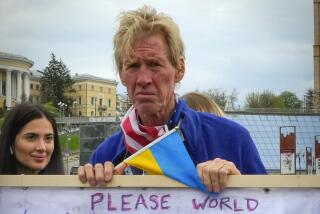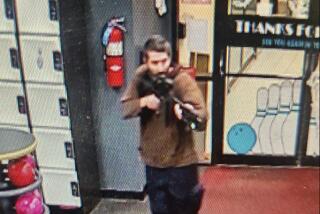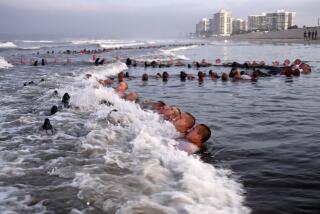Navy SEAL sniper’s Texas shooting death stirs controversy
Chris Kyle, by all measures, was one of the most decorated and talented soldiers in American history. He was also a victim of gun crime who was against gun control, and his death has already become cannon fodder in an emotional, rancorous debate.
Kyle, 38, a former Navy SEAL and author of “American Sniper: The Autobiography of the Most Lethal Sniper in U.S. Military History,” was killed Saturday afternoon at a secluded gun range at the Rough Creek Lodge southwest of Fort Worth. One of his friends, Chad Littlefield, 35, was also killed. After the shootings, a post on Kyle’s Facebook page identified Littlefield as a manager for a local chemical manufacturing company.
Officials suspect the pair had taken a troubled 25-year-old Marine and Iraq war veteran, Eddie Ray Routh, to the range as a kind of shooting therapy that Kyle conducted with some trauma-afflicted military veterans. Police say Routh, for reasons unknown, then killed both men with multiple shots from a semiautomatic pistol before fleeing, police said.
In jail on Sunday evening, a day after his arrest, Routh refused to give a food tray back to his jailers and tried to attack them with it, police told the Dallas Morning News. He was Tasered, then placed in a restraining chair and put on suicide watch. Erath County Sheriff Tommy Bryant reported that Routh, who faces two capital murder charges, had been receiving death threats.
Kyle, who claimed to have killed more than 150 Iraqis over four deployments, had made the increasingly common postwar move from shadow to spotlight, with a book and TV appearances relating to his career as a highly accurate sniper. He was a hero to some; others were uncomfortable with the pride he took in killing, which he said was simply a part of war.
In a recent video interview with Guns.com posted to YouTube two weeks ago, Kyle talked about his opposition to gun control. “You start putting these bans in effect, and these people who don’t know anything about the guns -- then you start thinking, ‘Well, who needs 30-round magazines?’ I’m like, really? That’s opening the doors, and you start taking more of our rights.
“You look at Switzerland, it has the lowest crime rate,” he said, before adding that “everyone has a weapon.... Everybody’s armed. The lowest violence. Something to it.”
Not surprisingly, the video’s comments section reflects the gamut of emotions provoked by Kyle’s death, from remembrances and calls to honor a fallen soldier to using his death to raise questions about gun control to a high-profile politician blaming Kyle for taking a possibly PTSD-afflicted veteran to a gun range.
On Monday morning, former Texas congressional representative and perennial presidential candidate Ron Paul tweeted: “Chris Kyle’s death seems to confirm that ‘he who lives by the sword dies by the sword.’ Treating PTSD at a firing range doesn’t make sense.”
Reaction on Twitter was swift. “Why would you say such an ugly, insensitive thing, publicly? His family & friends are grieving his loss & you mock. Shame on you,” one user replied. “So all veterans, once done serving our nation with honor, deserve to be murdered as civilians?” said another. “Wow.”
Others, like Mother Jones co-editor Clara Jeffrey, used Kyle’s death to illustrate their gun control point.
“So much for good/talented guy with a gun being able to stop mentally ill guy with a gun,” Jeffrey tweeted Saturday, adding, “so if a Navy SEAL and reputed best sniper in the world AT A GUN RANGE can’t take down a sick guy on a rampage ... “
“I hope tragedy finds its way into your life,” one user responded. “I wish nothing but pain and heartache for you.” Another added, “I hope everything bad that can happen to your family happens x3 and you get to watch it all....”
Harry Croft, a San Antonio psychiatrist who has studied thousands of veterans with post-traumatic stress disorder, worried that the incident, instead of having gun control implications, could instead damage public perception of veterans. He stressed that such killings are highly atypical of PTSD-afflicted veterans -- suicides are more frequent.
“This kind of murder is not common,” Croft said. “I want to make sure that people understand that.... These kind of events increase the stigma of our veterans and especially those with PTSD.”
Croft also questioned the wisdom of taking a troubled veteran to a place with guns -- because of the risk of suicide, not homicide -- but said he respected Kyle’s intentions and downplayed some of the likelihood of gunfire triggering a PTSD reaction.
“One of the complaints I get from veterans is: ‘How can that therapist help me? They’ve never been in combat; they don’t have a clue what I’ve been through.’ Here’s a guy who had a clue!” Croft said of Kyle. “Some would say, ‘Why would you take someone to a gun range where you might hear those sounds?’ Well the difference is, at the gun range, you might expect to hear those sounds.”
Rorke Denver, a reserve SEAL team lieutenant commander based in San Diego who served with Kyle, told The Times on Sunday, “That type of shooting can actually be cathartic, calming,” particularly for veterans who have just returned home after being accustomed to carrying weapons.
In his book, Kyle described how his gun range therapy worked:
“We go hunting a couple of times a day, shoot a few rounds on the range, then at night trade stories and beers. It’s not so much the war stories as the funny stories that you remember.... As you’d expect if I’m involved, there’s a lot of bustin’ going on back and forth, giving each other hell. I don’t always get the last laugh, but I do take my shots. The first time I had some of them out to one of the ranches, I took them out on the back porch before we started shooting and gave them a little orientation. ‘All right,’ I told them, picking up my rifle, ‘since none of you are SEALs, I better give you some background. This here is a trigger.’ ‘Screw you, Squid!’ they shouted, and we had a good time from there on out, pushing each other and making fun.
“What wounded veterans don’t need is sympathy,” Kyle wrote. “They need to be treated like the men they are: equals, heroes and people who still have tremendous value for society.”
ALSO:
Texas judge faces ‘court of inquiry’ into wrongful conviction
Alabama abduction: Sheriff thanks man for ‘taking care of our child’
‘Bambigate’: Indiana pair rescue deer, get snarled in legal woes
More to Read
Sign up for Essential California
The most important California stories and recommendations in your inbox every morning.
You may occasionally receive promotional content from the Los Angeles Times.










